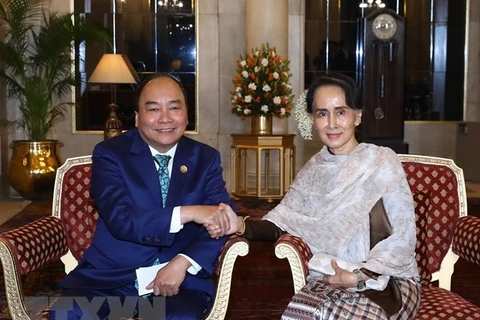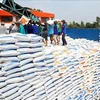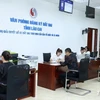Hanoi (VNA) – Many Vietnamese firms have shifted their focus to new markets like Myanmar but doing business in the once-isolated nation is not easy, largely due to its poorly-crafted business regulations.
Vietnam is one of the first countries to promote trade with Myanmar, said Vu Cuong from the Ministry of Industry and Trade, adding that made-in-Vietnam goods are popular among Myanmar consumers due to their quality and prices.
However, Vietnamese exporters have experienced bumpy rides shipping their products to Myanmar. According to Cuong, in addition to high transportation costs, Vietnamese products are facing stiff competition from similar ones from countries such as China and Thailand.
Legal issues remain one of the biggest barriers for doing business in Myanmar, said Nguyen Thanh Nam, director of Viettel Myanmar. Military-run group Viettel is the largest Vietnamese investor in Myanmar with total committed investment of approximately 1.4 billion USD to develop a mobile network joint venture.
In Vietnam, building a base transceiver station only requires two or three permits from the local departments of information and communications and construction. But to do this in Myanmar, a company must apply for up to seven permits, from local people to authorities at different levels, Nam explained.
Even after getting approval from the government, ministries and other public agencies, a foreign firm must continue working with state and district governments to complete a number of other administrative steps, he added.
As Myanmar has just started opening its economy, it has to regularly amend the legal system. Hence, firms have to be active to keep abreast of changes, the director noted.
Echoing Nam’s view, Dang Hai Nha, Director of the Bank for Investment and Development of Vietnam (BIDV), Yangon branch, said many legal documents in Myanmar are too general and briefly explained, making them difficult for businesses to comprehend.
Cuong from the Ministry of Industry and Trade suggested the Vietnamese producers put more efforts into improving the quality of their products and studying local consumer culture. They must also invest in branding and label their products in Myanmar or English languages to better inform customers.
According to the Ministry of Industry and Trade, trade between Vietnam and Myanmar has grown steadily in recent years. Two-way trade expanded at an average pace of 27.3 percent annually from 2010-2016. The two countries saw a year-on-year surge of 50.9 percent in trade to 828 million USD last year.
Since 2012, Vietnam has enjoyed a trade surplus with Myanmar which was estimated at 375 million USD in 2017. But trade with Myanmar only accounted for 0.2 percent of Vietnam’s total foreign trade and less than 2 percent of Vietnam’s trade with ASEAN nations.
Vietnam mostly exports telephones and accessories, iron and steel products, vehicles and parts and machinery to Myanmar while main imports include fruits and vegetables and maize.-VNA
Vietnam is one of the first countries to promote trade with Myanmar, said Vu Cuong from the Ministry of Industry and Trade, adding that made-in-Vietnam goods are popular among Myanmar consumers due to their quality and prices.
However, Vietnamese exporters have experienced bumpy rides shipping their products to Myanmar. According to Cuong, in addition to high transportation costs, Vietnamese products are facing stiff competition from similar ones from countries such as China and Thailand.
Legal issues remain one of the biggest barriers for doing business in Myanmar, said Nguyen Thanh Nam, director of Viettel Myanmar. Military-run group Viettel is the largest Vietnamese investor in Myanmar with total committed investment of approximately 1.4 billion USD to develop a mobile network joint venture.
In Vietnam, building a base transceiver station only requires two or three permits from the local departments of information and communications and construction. But to do this in Myanmar, a company must apply for up to seven permits, from local people to authorities at different levels, Nam explained.
Even after getting approval from the government, ministries and other public agencies, a foreign firm must continue working with state and district governments to complete a number of other administrative steps, he added.
As Myanmar has just started opening its economy, it has to regularly amend the legal system. Hence, firms have to be active to keep abreast of changes, the director noted.
Echoing Nam’s view, Dang Hai Nha, Director of the Bank for Investment and Development of Vietnam (BIDV), Yangon branch, said many legal documents in Myanmar are too general and briefly explained, making them difficult for businesses to comprehend.
Cuong from the Ministry of Industry and Trade suggested the Vietnamese producers put more efforts into improving the quality of their products and studying local consumer culture. They must also invest in branding and label their products in Myanmar or English languages to better inform customers.
According to the Ministry of Industry and Trade, trade between Vietnam and Myanmar has grown steadily in recent years. Two-way trade expanded at an average pace of 27.3 percent annually from 2010-2016. The two countries saw a year-on-year surge of 50.9 percent in trade to 828 million USD last year.
Since 2012, Vietnam has enjoyed a trade surplus with Myanmar which was estimated at 375 million USD in 2017. But trade with Myanmar only accounted for 0.2 percent of Vietnam’s total foreign trade and less than 2 percent of Vietnam’s trade with ASEAN nations.
Vietnam mostly exports telephones and accessories, iron and steel products, vehicles and parts and machinery to Myanmar while main imports include fruits and vegetables and maize.-VNA
VNA























